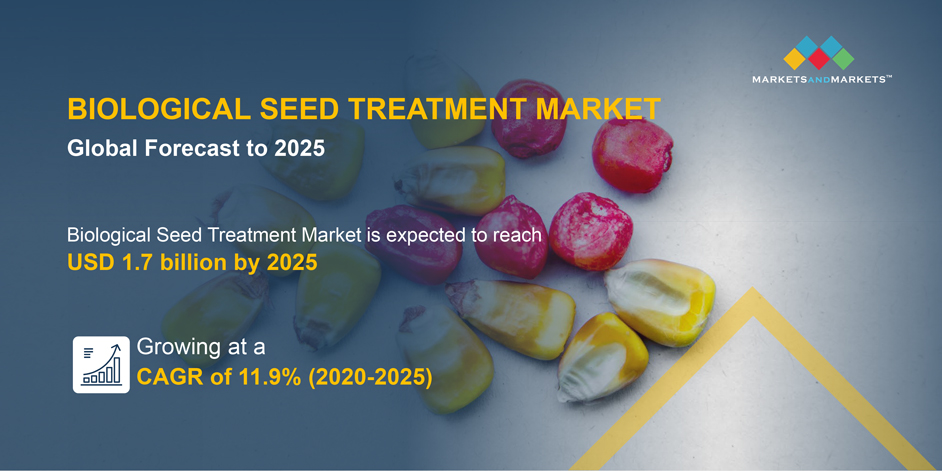Thebiological seed treatment marketis projected to reach USD 1.7 billion by 2025, and it was valued at USD 0.9 billion in 2020. It is expected to grow with CAGR of 11.9%. The global demand for biological seed treatment solutions is increasing as they ensure the farmers in protecting their potential yield, quality by minimizing the crop losses. Although, the biological seed treatment market is a small sector in the global agrochemical industry, the market has been growing at a significant rate due to agricultural and environmental benefits globally and increasing need for a sustainable approach in agricultural operations in developed countries. Strong research funding by key manufacturers for product development is projected to drive the growth of the market over the next five years.

Download PDF Brochure:
https://www.marketsandmarkets.com/pdfdownloadNew.asp?id=162422288
Driver: Environmental concerns associated with chemical seed treatment
The demand for biological seed treatment has significantly increased as a result of high awareness of their potential and the growing attention to the environmental and health risks associated with conventional chemicals. Chemical seed treatments are detrimental to the environment and pose a serious risk to pollinators. The neonicotinoid class of insecticides is considered highly toxic to honeybees. Microorganisms employed as active substances in pest management are recognized as generally safe for the environment and non-target species, in comparison with synthetic chemicals.
Challenges: Inconsistent performance and incompatibility with certain pesticides
The features of biological seed treatments that have discouraged investment are their inconsistent results. The most common problems encountered during the usage of such products include desiccation and environmental conditions that discourage their growth. Successful inoculants with one crop may not work as effectively with another crop. For instance, Trichoderma is more effective for the increase in yield in tomatoes than cucumbers. Choosing just one or two microbes is not as effective as loading with an entire community. However, effectiveness can sometimes be increased by a combination of microbes, with various growth requirements. For instance, fungi can be combined with PGPR.
Fastest-growing segment by function: Seed protection segment
On the basis of function, the global market has broadly been segmented into seed enhancement and seed protection. Biological seed treatments aimed at seed protection provide targeted control of certain pests and fungal diseases during the early seedling stage. Biological seed treatments are used on multiple crops to control a variety of pests. It ensures uniform stand establishment through defense against numerous soil-borne pathogens and insects.
Request Sample Pages:
https://www.marketsandmarkets.com/requestsampleNew.asp?id=162422288
North America regions increasing preference for high quality produce
The increasing agricultural practices and requirement of high-quality agricultural produce are factors that are projected to drive the biological seed treatment market growth in this region. The government policies adopted by developed countries for the ban on key active ingredients are the major factors encouraging the growth of this market in North America region. Hence, North America is projected to be the fastest-growing region in the global market. RD investments for the development of biological seed treatment and installation of new production capacities by key players are projected to drive the market growth in the next five years.
Key players in this market include BASF SE (Germany), Bayer AG (Germany), Novozymes A/S (Denmark), Syngenta Group (Switzerland), Corteva Agriscience (US), Valent BioSciences (US), Verdesian Life Sciences (US), Plant Health Care (US), Precision Laboratories (US), Koppert Biological Systems (Netherlands), and Italpollina (Italy)
























